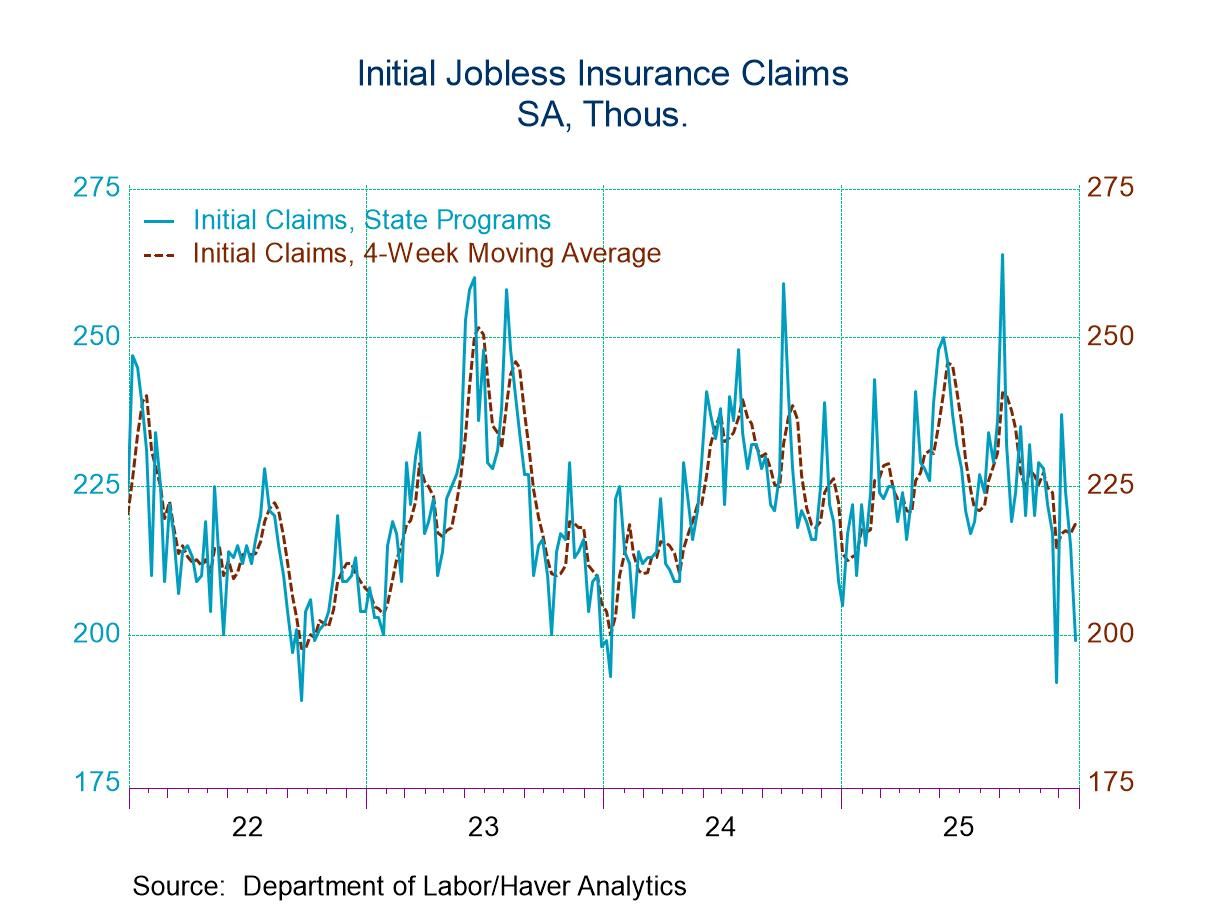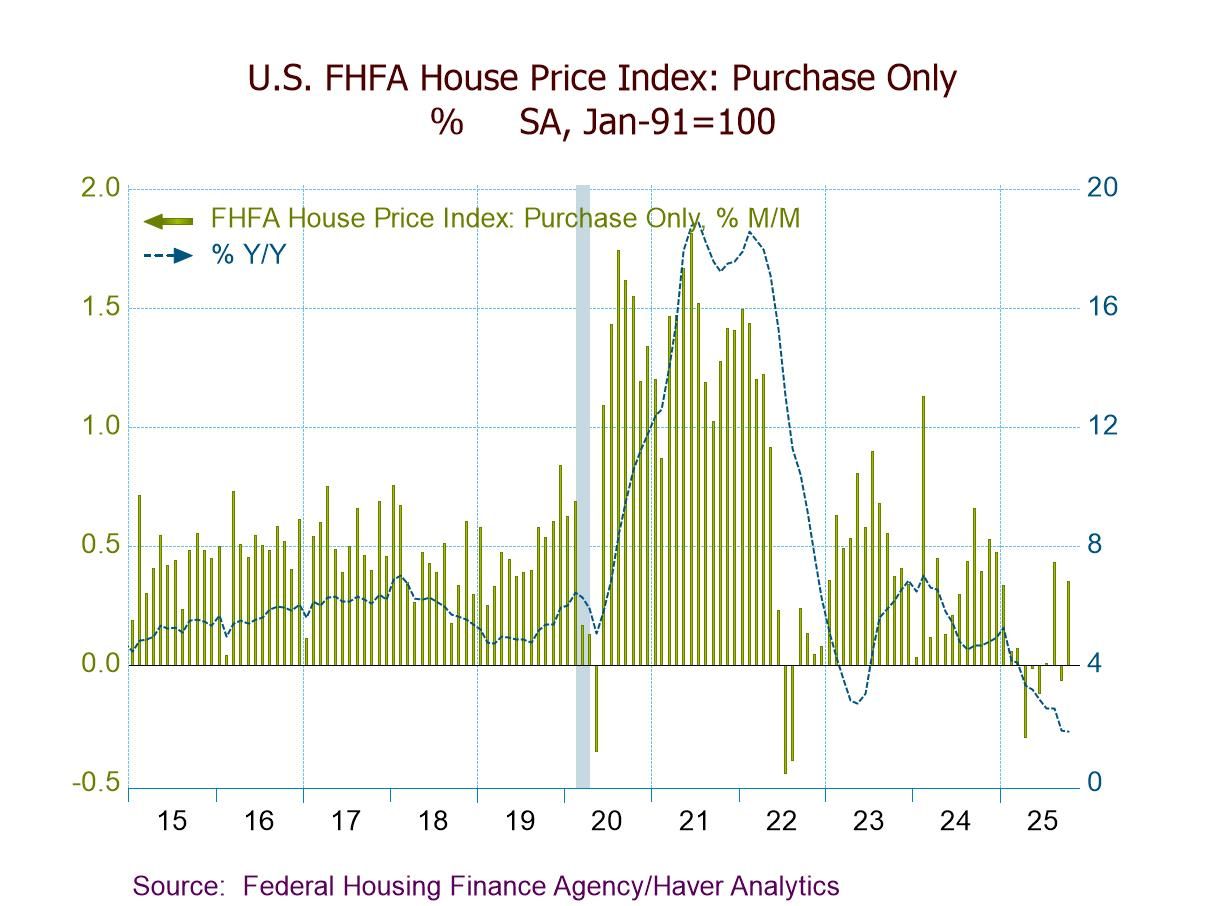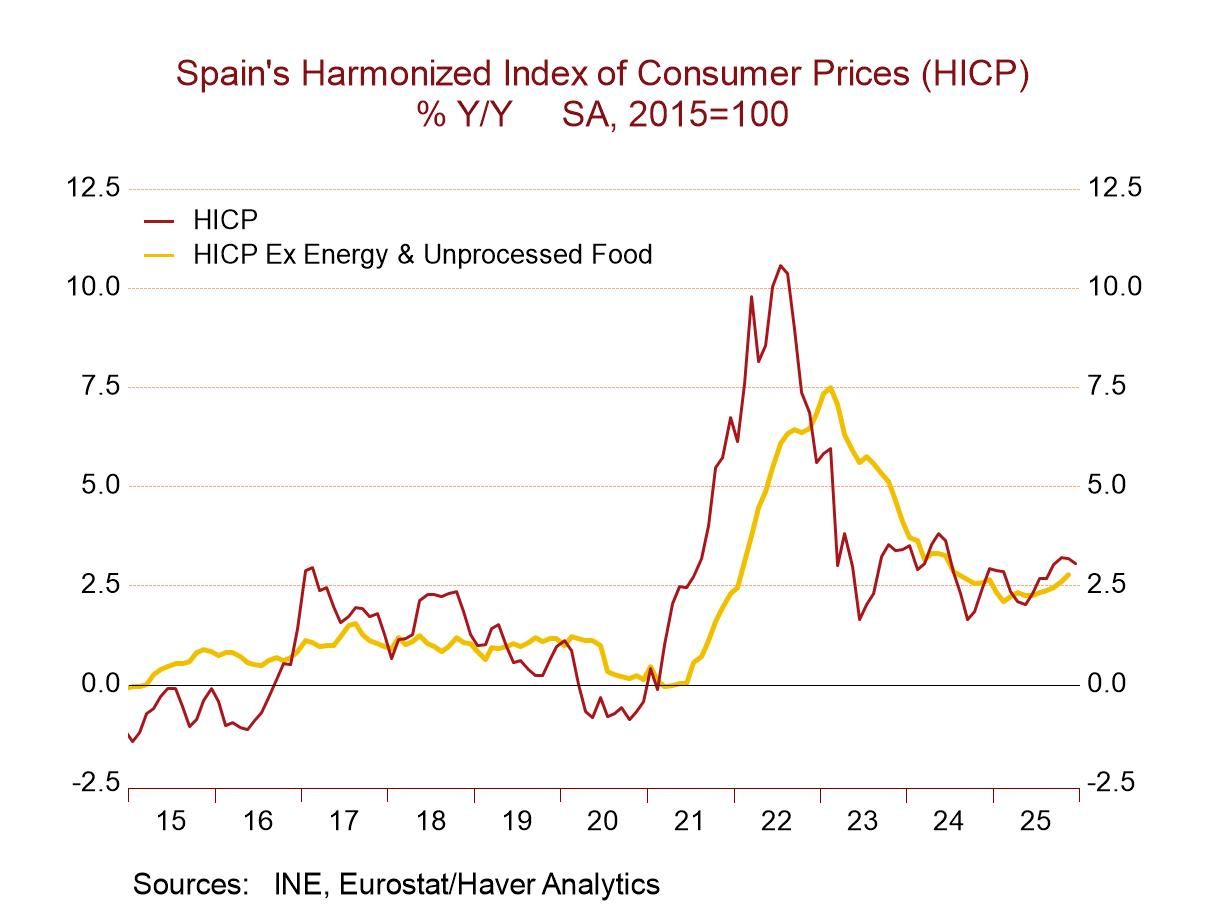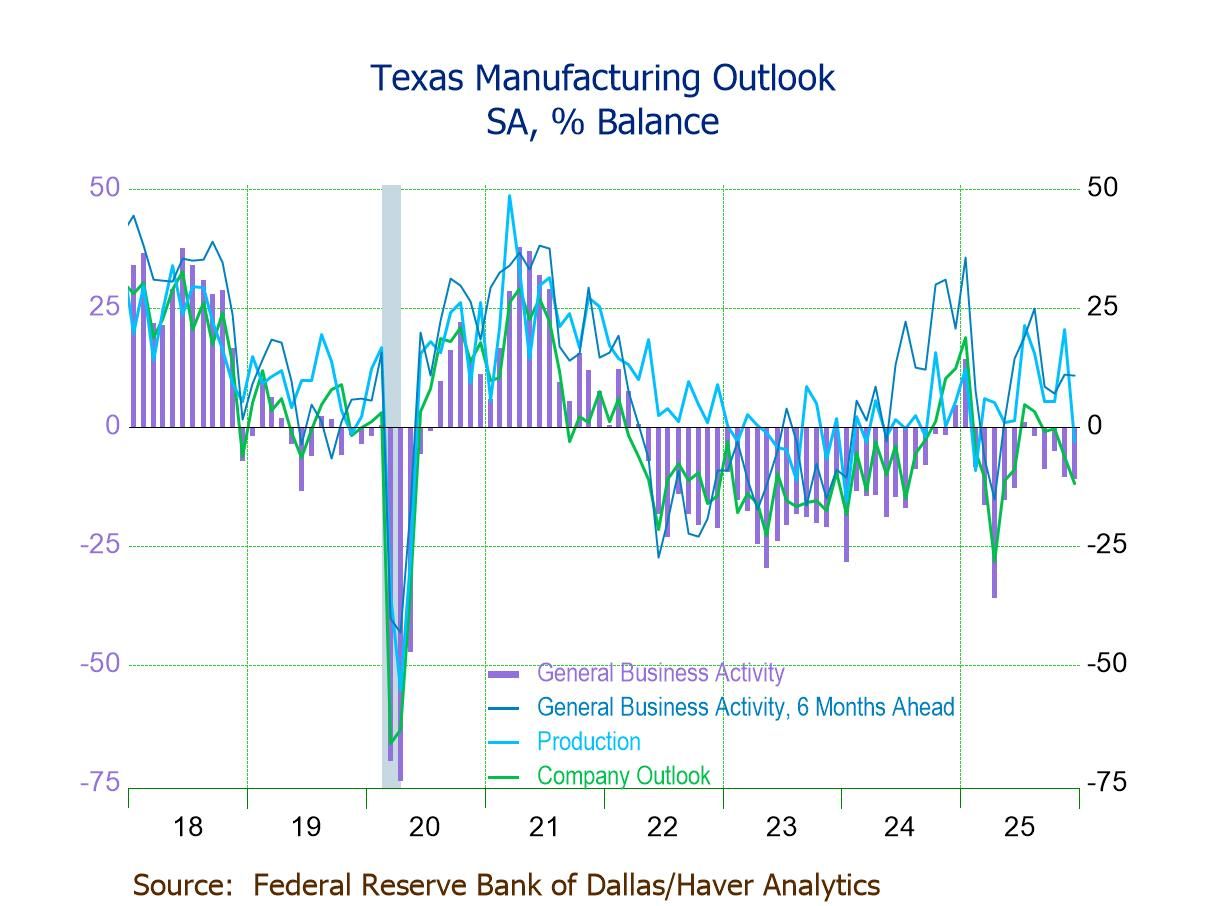 Global| May 27 2011
Global| May 27 2011A shaking out in the Euro-Area ?
Summary
The EU regional index rose in May but the EMU index fell The table above carries the EU at the top of the table and reports the CHANGE in the EMU index in the bottom section along with country detail. In the not so merry, merry month [...]
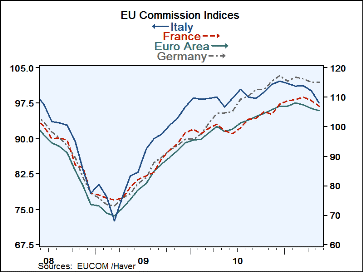 The EU regional index rose in May but the EMU index fell The table above carries the EU at the top of the table and reports the CHANGE in
the EMU index in the bottom section along with country detail.
The EU regional index rose in May but the EMU index fell The table above carries the EU at the top of the table and reports the CHANGE in
the EMU index in the bottom section along with country detail.
In the not so merry, merry month of May many EMU members suffered large declines in their economic sentiment. Every member in the table saw a decline. We have omitted Spain this month because it did not report out an economic sentiment measure on a timely basis.
Germany has seen sentiment drop for three-months in a row; EMU sentiment has dropped for three months in a row. Greece and Portugal have seen sentiment drop for three months running; if Spain's measure drops in May its sentiment will have dropped for three-months in a row as well. Italy and France have had sentiment declines over each of the past two months. The UK another large economy has seen sentiment rise in May; it is an EU member, not an EMU member.
Industrial confidence fell this month to +4 from +5 in the EU region. Consumer confidence cut its weakness to some extent posing a -11 in place of April's -14 reading. Retailing improved with a reading of -3, up from -4 in April. Construction was flat in the month. Services improved to +8 from +7.
But when we rank the sector performance most are still quite weak. The ranking percentage standings for the high/Low ranges are the stronger ones with the EU reading for economic sentiment in the 78th percentile of its range; that sounds pretty solid. But when ranked by a different criterion over the same period, the position of the current index in the same historic queue of values, the answer is a weaker 69.6% (far right-hand column). The range rankings tell us the position of the current ranking as percentile of its range of values; being in the 78th percentile the current reading is not weak (and it is above its average). But the queue standing tells us how often the indicator is weaker than its current reading: this 69.6% of the time; that means it is stronger some 30 percent of the time. That metric speaks to me more clearly of the current plight for EU/EMU. The EMU positional readings are in the table and are similar to the EU ratings but slightly weaker.
When we look at the queue standings by country we get a real eye opener. EMU stands in the 67th percentile of its queue and Germany stands in the 93rd percentile of its queue. But after that there is steep fall off. The EMU measure gets a lot of its vitality from the strong German reading because of the German economy's size. The reading for France is in the 70th percentile, Italy stands in its 38th percentile Portugal is in its 8th percentile and Greece in its 3rd percentile. The Greek reading is lower than this only 3% of the time- THREE PERCENT. The UK stands in the 49th percentile of its queue.
Similarly we can look at the EU sector performance using these queue positions. Even though MFG has been slipping it stands in the 91st percentile of its queue for EU and is the leading sector pulling the community into recovery. The next relatively strongest sector is retailing, in its 75th queue percentile. After that we drop to the 55th percentile for consumer confidence. Next, we drop to the 44th percentile for services. Finally construction is in the 39th percentile of its queue.
This month the largest change was from consumer confidence that rose from -14 to -11. That three point rise was the fourth largest month-to-month gain in its history to 1990.
On balance there seems to be a lot of shifting going on in the Zone. It was a tough month with oil prices spurting and debt concerns having reemerged. There is a companion story here of political unrest that links to the economic distress and complicates things a bit more.
The G-8 is meeting this weekend. But Europe's mess is not front and center there. The leaders are relatively more concerned with getting some aid to the NADs (New Arab Democracies) and to dealing with the 'war effort' in Libya. Still, the difficulties in Europe will probably get a mention in the leaders' communiqué. But Europe has its own mechanisms in place to deal with its issues. These are being continually tested and European reform projects remain a work in progress.
| EU Sectors and Country Level Overall Sentiment | |||||||||||
|---|---|---|---|---|---|---|---|---|---|---|---|
| EU | May 11 |
Apr 11 |
Mar 11 |
Feb 11 |
%ile | Rank | Max | Min | Range | Mean | By Q Rank% |
| Overall Index | 105.4 | 105.1 | 107.4 | 107.3 | 78.4 | 77 | 116 | 67 | 49 | 100 | 69.6% |
| Industrial | 4 | 5 | 7 | 6 | 91.5 | 22 | 8 | -39 | 47 | -7 | 91.3% |
| Consumer Confid | -11 | -14 | -13 | -12 | 61.8 | 113 | 2 | -32 | 34 | -11 | 55.3% |
| Retail | -3 | -4 | 1 | 1 | 68.6 | 63 | 8 | -27 | 35 | -6 | 75.1% |
| Construction | -26 | -26 | -27 | -26 | 35.6 | 154 | 3 | -42 | 45 | -20 | 39.1% |
| Services | 8 | 7 | 10 | 10 | 60.6 | 96 | 34 | -32 | 66 | 11 | 45.5% |
| % M/M | May 11 |
Based on Level | Level | ||||||||
| EMU | -0.6% | -1.1% | -0.6% | 105.5 | 74.8 | 82 | 118 | 70 | 48 | 100 | 67.6% |
| Germany | -0.1% | -0.8% | -0.6% | 115.1 | 89.6 | 16 | 120 | 73 | 47 | 100 | 93.7% |
| France | -1.7% | -1.1% | 0.8% | 106.9 | 75.6 | 75 | 117 | 75 | 42 | 100 | 70.4% |
| Italy | -2.7% | -1.0% | 0.1% | 97.5 | 52.0 | 156 | 121 | 73 | 48 | 100 | 38.3% |
| Greece | -0.3% | -5.4% | -1.3% | 74.0 | 12.8 | 245 | 120 | 67 | 53 | 99 | 3.2% |
| Portugal | -2.2% | -1.8% | -6.3% | 85.2 | 34.2 | 231 | 117 | 69 | 48 | 100 | 8.7% |
| Memo:UK | 2.6% | -4.9% | 2.6% | 102.1 | 73.5 | 129 | 116 | 64 | 51 | 100 | 49.0% |
| All since Feb 1990 | 253 -Count | Services: | 176 -Count | ||||||||
| Sentiment is an index, sector readings are net balance diffusion measures | |||||||||||
Robert Brusca
AuthorMore in Author Profile »Robert A. Brusca is Chief Economist of Fact and Opinion Economics, a consulting firm he founded in Manhattan. He has been an economist on Wall Street for over 25 years. He has visited central banking and large institutional clients in over 30 countries in his career as an economist. Mr. Brusca was a Divisional Research Chief at the Federal Reserve Bank of NY (Chief of the International Financial markets Division), a Fed Watcher at Irving Trust and Chief Economist at Nikko Securities International. He is widely quoted and appears in various media. Mr. Brusca holds an MA and Ph.D. in economics from Michigan State University and a BA in Economics from the University of Michigan. His research pursues his strong interests in non aligned policy economics as well as international economics. FAO Economics’ research targets investors to assist them in making better investment decisions in stocks, bonds and in a variety of international assets. The company does not manage money and has no conflicts in giving economic advice.



